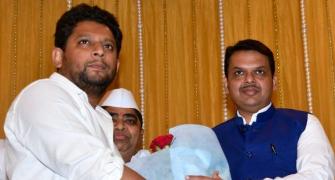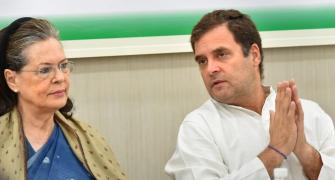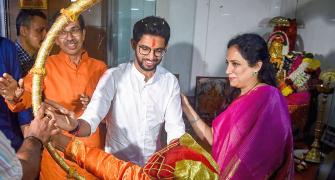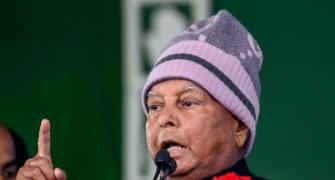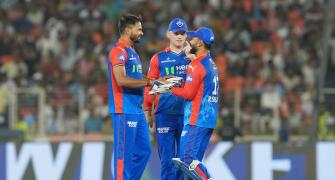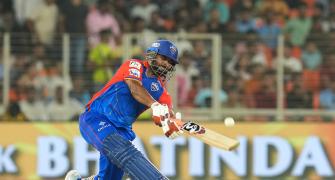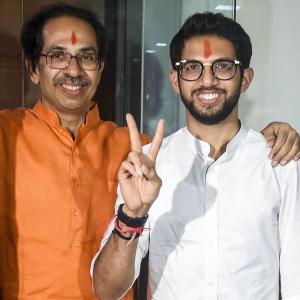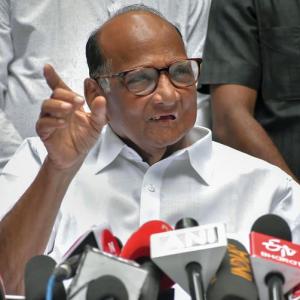There are limitations to milking national security, says Sanjeev Nayyar.
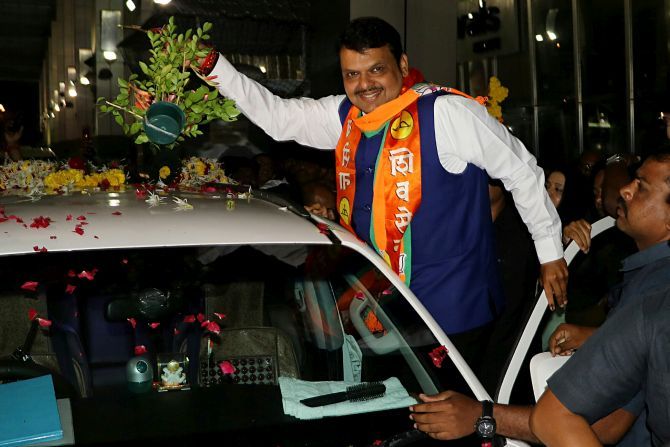
Many expected the Bharatiya Janata Party-Shiv Sena combine to sweep the Maharashtra assembly election so the 161 seats won between them is being perceived as a major loss, especially for the BJP.
It is true that the BJP did not do everything right but to magnify the fewer seats won (17) as a reversal of the BJP’s fortunes is misplaced especially if one looks at the trend of seats won since 1995.
|
Year |
BJP |
Shiv Sena |
Congress |
NCP |
|
1995 |
65 |
73 |
80 |
0 |
|
1999 |
56 |
69 |
75 |
58 |
|
2004 |
54 |
62 |
69 |
71 |
|
2009 |
46 |
44 |
82 |
62 |
|
2014 |
122 |
63 |
42 |
41 |
|
2019 |
105 |
56 |
44 |
54 |
Note: The NCP was formed in 1999; the 1995 elections were fought under the Congress banner.
Ever since the state of Maharashtra was formed in 1960 and up to 2014, the BJP-Sena combined were able to break the Congress-NCP stranglehold only once -- in 1995. Maharashtra was always a Congress bastion.
Due to a strong anti-Congress-NCP sentiment and a pro-Modi wave in 2014, the BJP won 122 seats, up 165%, and the Shiv Sena 63 seats, up 43%, in spite of the two fighting elections independently.
The point being made is that one must not compare the BJP's 105 seats against the 122 won in 2014, an exceptional year, but its ability to retain 105 out of 122. Also, the Sena's increase in 2014 could be out of respect for Balasaheb Thackeray since it was the first assembly poll post his death in 2012.
One must remember that a government seeking re-election faces anti-incumbency, in this case faced almost alone by the BJP since the Shiv Sena invariably behaved like an Opposition party even though it was part of the government.
It is also pertinent to note that the Sena was regarded as an elder brother in the alliance because of Balasaheb Thackeray's overarching personality and not because it won substantially more seats than the BJP. In fact, starting 2009, the BJP has been winning more seats than the Sena.
Compared to the BJP-Sena the Congress-NCP combine got 83 seats in 2014 and 98 in 2019. They are, however, nowhere near their peak of 140 and 144 seats won in 2004 and 2009.
The 54 seats the NCP won this time was because of Sharad Pawar's monumental efforts, but still less than what his party got in 1999. The Congress got two seats more than it did in 2014. It shows that the two parties still have a committed voter base, since they ruled for all but 10 years since 1960.
Having said the above, the BJP has lessons to learn.
One, there are limitations to milking national security. At a poll rally in Nashik, Prime Minister Narendra Damodardas Modi said, 'We want to create a paradise in Jammu and Kashmir once again and hug every Kashmiri.' Honestly, would any Nasik voter be concerned about hugging Kashmiris?
The Modi-Shah duo used the same approach in the 2017 Gujarat election and were lucky to scrape through.
Two, incumbent BJP governments must realise that 'Brand Modi' can supplement their voter base provided they deliver and devise sound local strategies.
Further, a victory in the Lok Sabha polls does not automatically translate into a victory in assembly polls or vice versa, as Kamal Nath and Ashok Gehlot discovered in Madhya Pradesh and Rajasthan.
Three, over-confidence. Why is it that the BJP, within a few years of being in power, has become so over-confident and believed they were God's gift to the electorate?
They behaved this way in 2004 and lost. The Modi-Shah duo did not repeat the mistake in 2019, but Maharashtra's leadership clearly has not learnt any lessons.
Over-confidence results in taking the electorate for granted (no voter likes that), arrogance (Pankaja Munde's body language) and under-estimating your opponents.
Four, the BJP underestimated Sharad Pawar. Chief Minister Devendra Fadnavis needed to remember that he was all of 8 years old when Sharad Pawar first became chief minister of Maharashtra in 1978.
Pawar has dominated and been an important part of state politics since 1978. He is connected to the grass-roots and the administrative system as few current day politicians are.
Moreover, when a 79-year-old politician-cancer survivor covers the length and breadth of the state to fight the elections, the public gets emotional and votes accordingly.
Five, the BJP welcomed leaders from every other party, it seemed.
On election eve I travelled to rural Kolhapur for the Haldi festival at Pattan Kodoli village. Based on limited conversations with rural folk, one can say that defections were not looked upon kindly.
In Vidharbha's Gondia constituency, Gopaldas Agrawal quit the Congress before the election and joined the BJP that gave him a ticket. Vinod Agarwal, who was denied the ticket, contested as an Independent and won.
Someone has to accept responsibility for allocating tickets that led to avoidable losses.
Six, agricultural distress in Vidarbha has existed for years so it cannot be the only reason why the BJP won only 15 out of 44 seats in the region, as against 29 in 2014.
The BJP also won only 6 out of 12 seats in Nagpur district as against 11 in 2014. These losses call for introspection.
Seven, use of central agencies against political foes before the election.
During Ahmed Patel's re-election to the Rajya Sabha in 2017 there were income-tax raids on a Karnataka minister who is alleged to have helped Patel's re-election. Similarly, enforcement directorate notices to Pawar on election eve backfired, as this was presented by him as an attack on Maratha asmita, notwithstanding that Pawar did not legislate reservations for Marathas, something the BJP did.
Timing raids on election eve is perceived to be an attempt to browbeat opponents.
Eight, voters have not forgotten the state government's proposal to set up a Muslim burial ground near the 11th century Shiv mandir in Ambernath and a Ganapati immersion ghat. At various times, the Fadnavis government proved itself more 'secular' than the Congress-NCP.
It is important for BJP state leaders to realise that an assembly election is more about what an incumbent government has done right while reminding the electorate of how the Opposition made a mess during its rule.
The BJP must reflect upon on why it could not better its tally in spite of many good initiatives, but to say it lost votes due to hyper-nationalism is wrong.
Sanjeev Nayyar is a chartered accountant and founder www.esamskriti.com. He tweets @NayyarSanjeev

